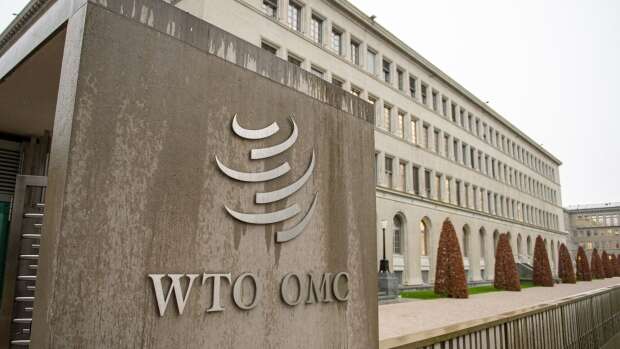WTO set to extend moratorium on e-Commerce tariffs for two years
The World Trade Organization agreed to extend a moratorium on e-commerce tariffs for two years after marathon negotiations in Abu Dhabi, while failing to secure deals on other contentious trade issues including a crackdown on agriculture and fisheries subsidies.
Speaking at the closing session, Director-General Ngozi Okonjo-Iweala called the WTO a “source of resilience” in a world shaken by geopolitical turmoil. She encouraged negotiators to continue discussions on their unfinished business.
Adding to the challenges at the 13th biennial ministerial of the Geneva-based institution are dozens of elections this year in major economies as incumbent politicians from Brussels to New Delhi feel pressure from farmers, truckers and other workers protesting for relief from inflation and foreign competition.
At the start of the week “I said trying to get achievements gains these headwinds would be tough,” Okonjo-Iweala, whose term ends in August 2025, said during a press conference. “We didn’t achieve all we wanted to, but what we did achieve I think was pretty amazing.”
As the talks ended past midnight after running for 16 hours on Friday, the last-minute pact to preserve the e-commerce moratorium until 2026 was the most important breakthrough. It also surprised some observers who heard European Union officials say just minutes before a draft agreement was announced that the week-long negotiations were headed for total failure.
Still, falling short on agriculture and fisheries may renew criticism that the nearly 30-year-old WTO — with just two major multilateral accords to its credit — is incapable of brokering the required consensus among its 166 members as the global economy fragments into rival blocs and wars in Ukraine and Gaza disrupt international trade.
“It’s clear that it is often difficult to reach consensus,” said Valdis Dombrovskis, European Commission’s vice president for trade. “Despite that, we were very close and there’s a willingness and determination of a vast majority of membership to continue negotiations until it gets over the line.”
India, Indonesia and South Africa had signaled their opposition to renewing the e-commerce moratorium, but supported it in the end. They’re among countries worried about losing control of data flows, as well as the market dominance of US Big Tech companies.
Tariff-Free Internet
About 25% of all global trade is now conducted digitally and it’s expected to continue to rise faster than traditional trade in goods over the next decade. The problem the WTO faces is how to deal with some governments want the authority to collect customs duties from growing sectors of online commerce that are hard to track and measure across borders.
Among the questions raised in today’s e-commerce deal is whether this will be the last two-year extension, which Okonjo-Iweala tried to address.
“We agreed to extend with a date for the moratorium to end at the end of that time, but this gives enough time, enough notice, so that business can have the time to adjust,” she said.
Business groups have warned that allowing the moratorium to lapse would cause widespread uncertainty and raise costs.
“It’s a relief to see the moratorium survive by the skin of its teeth,” said Tiffany Smith, vice president of global trade policy at the National Foreign Trade Council in Washington. “Its collapse would be a significant blow to the rules-based trading system.”
Negotiations went beyond their scheduled end on Thursday night as India found itself at the center of the most contentious discussions. Delegates said the world’s most populous nation was blocking a deal on the e-commerce moratorium unless it received one of its main goals — concessions on subsidies for their farmers to meet their domestic food security needs.
Coming into the talks, India said its top priority was a revival of the WTO’s seven-person appellate body, which the US disabled in late-2019 by blocking appointments to empty seats. There was no progress this week fixing it, though the members confirmed their goal to find a solution by the end of the year to address that part of their crippled dispute-resolution system.
“We feel sad that some countries are still obstructing significant outcomes which could have helped less-developed and developing countries gain confidence in the working of the WTO,” Indian Trade Minister Piyush Goyal told reporters this week. “We feel sorry that the agenda of some large corporations prevails over public good.









